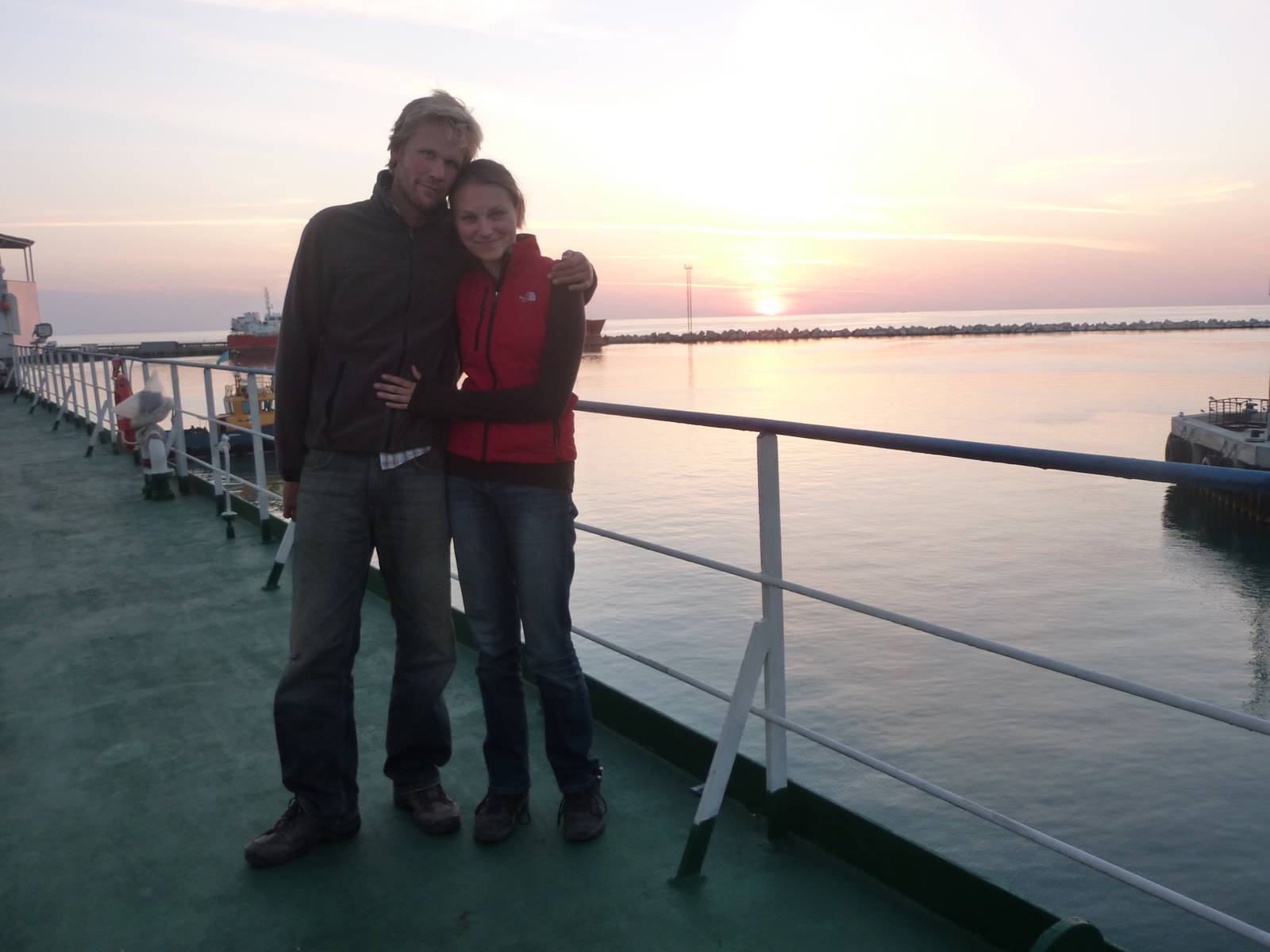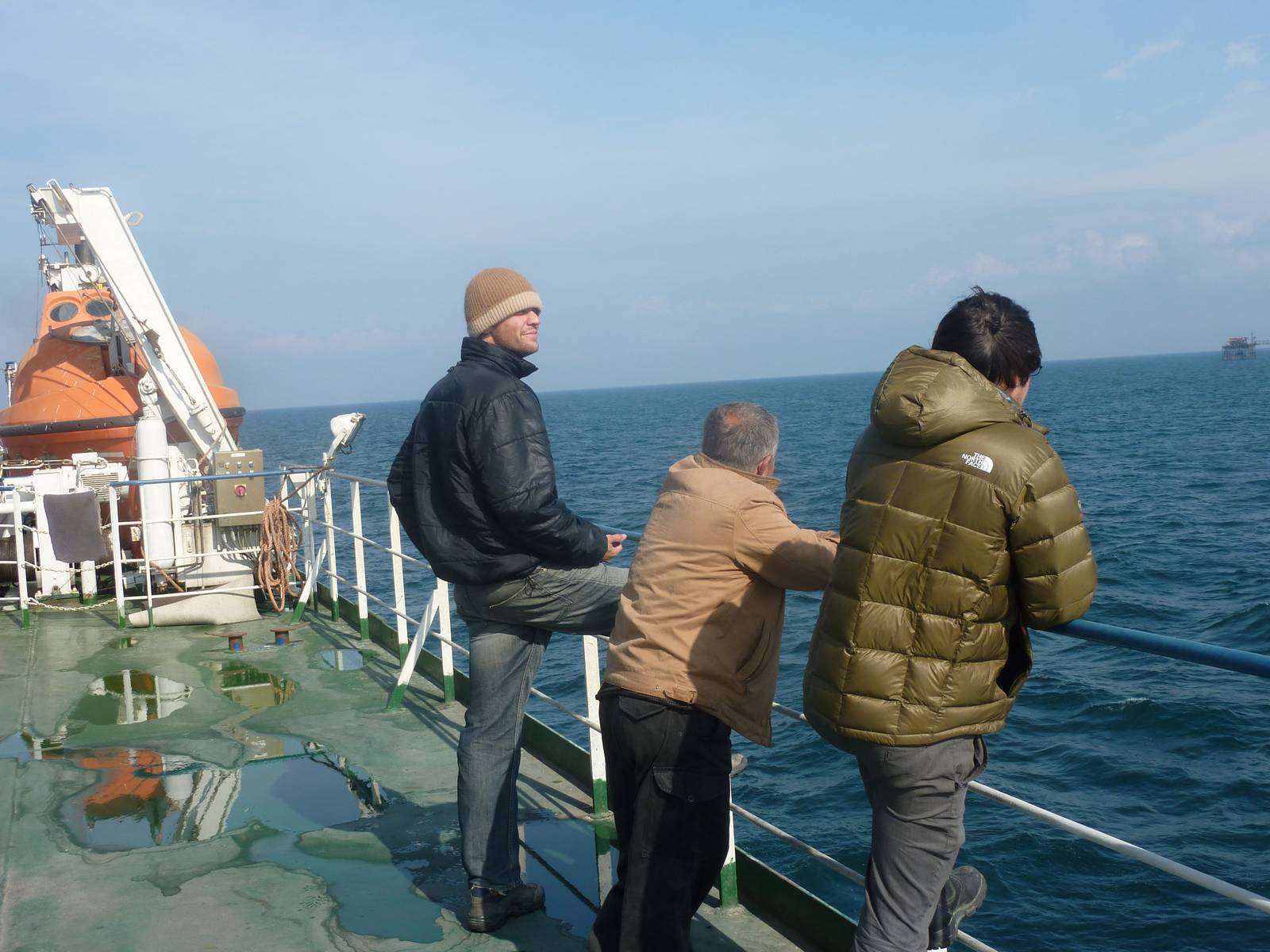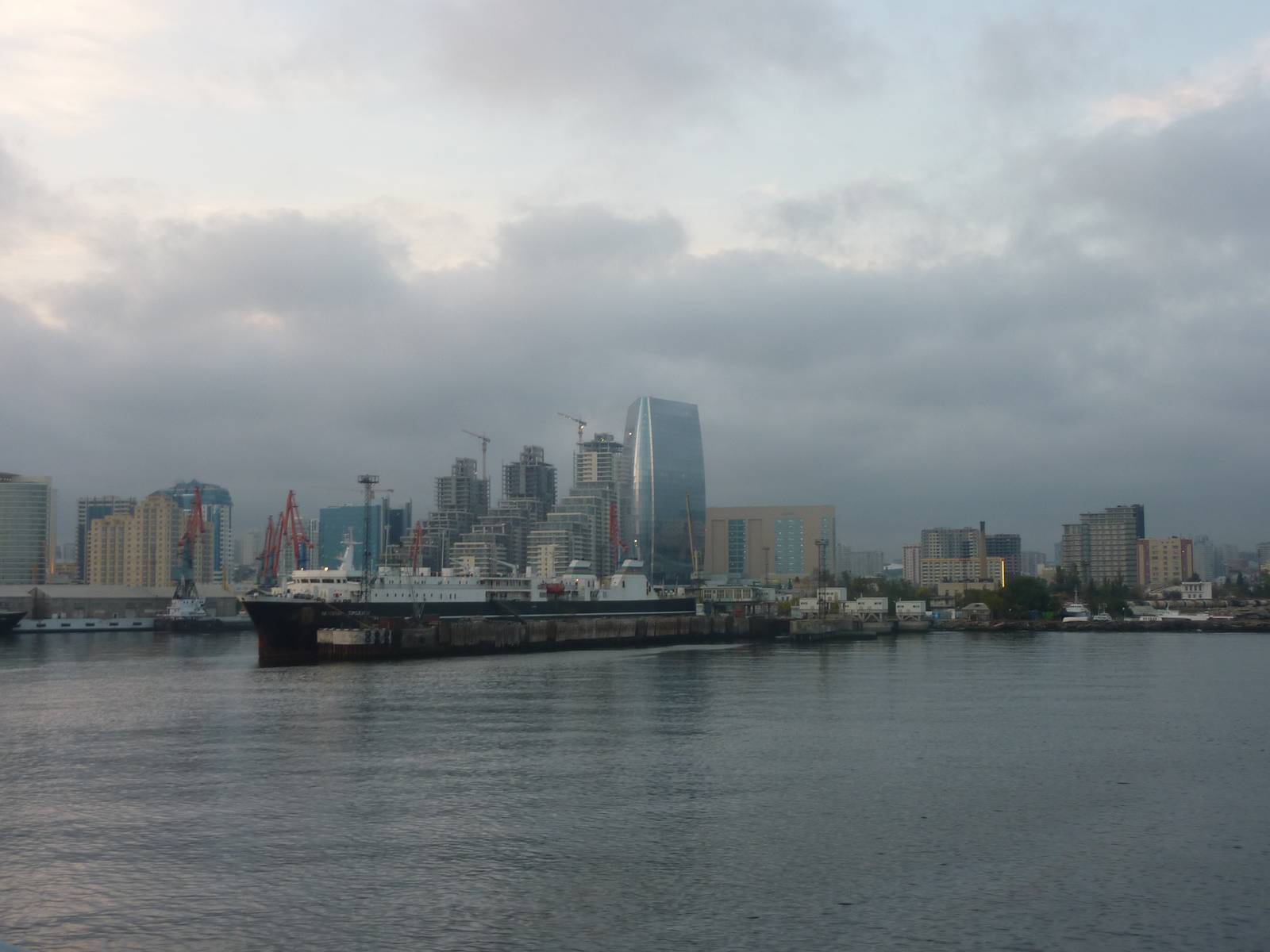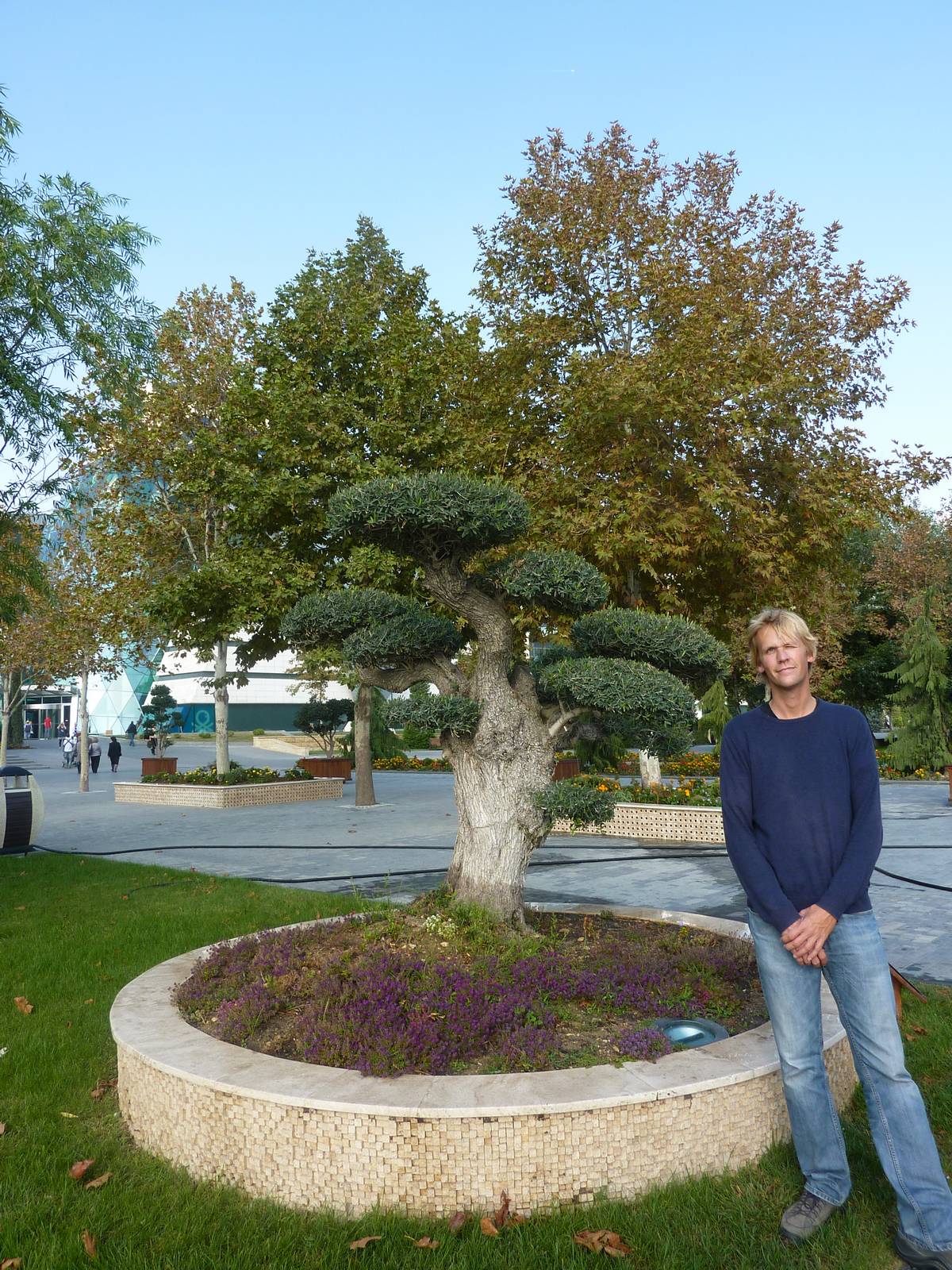Aktau
is not an attractive city. It has oil, gas and a lot of expats
working for oil companies. And it has the Aktau-Baku ferry. But
there's hardly anything to do there and the accommodation options are
pretty poor too. There are many top end hotels, but unfortunately
they were way out of our budget, so that we were left with the low
cost options... I will spare you the details, let's just say it was
nearly as bad as the road we just drove. We were praying we wouldn't
have to stay in the city for too long.
We
went directly to the harbor to check for the ferry. Only one person
spoke some English and the information he gave us was not a happy
one. The ferry has just left yesterday and no one knows when the next
one would be ready to leave, but we should come back tomorrow. We
already heard about tourists, who were asked to come back tomorrow
for two weeks, so we were not in the best moods. We even considered
making a small trip around Aktau and skipping the appointment, but we
finally decided against it and went to the harbor as we were told to.
For the first half an hour everybody simply ignored us. They were
speaking to each other, pointing in our direction from time to time,
but no one seemed to want to talk to us. And when they finally did,
all we heard was “OK, tomorrow morning 6 o'clock you go”. We were
shocked! We were not expecting that, so we had to go back to the
hotel to grab the money and all the papers do deal with the customs.
It wasn't an easy job, I can tell you that. The harbor workers were
not much help either. We got some ferry declarations on which we had
to collect 5 or 6 stamps and some signatures, but everyone seemed to
know only his part of the job, so finding out where to get the next
stamp was quite a challenge (especially that the documents were
mostly in Russian). And some of the workers after finishing their
part told us everything was OK now and we could go home, though we
were still missing some signatures. All in all it was one big chaos
and we really had to breathe deeply and try hard not to explode. But
the thought of leaving Aktau and our hotel was helping us get through
it all. And we finally knew the cost as well. The price was nearly
100 USD per person, and for the car 80 USD per meter of length. We
had to pay around 50 USD of harbor fee as well. Fortunately it was
still in our budget.
We
woke up early the next day and came to the harbor at 6, just to find
out we can not enter before 9 o'clock anyway. So we parked our cars
and went simply back to sleep. At 9 we turned up at the gate again
just to be told that we should have come earlier and that we have to
park quickly and run back to the passport control immediately. We did
it just to discovered that the passport office would not open for the
next 20 minutes anyway, so that we started wondering why the hell
they told us to come at 6 o'clock in the morning in the first place.
We had even more time to wonder about it after we went through, as it
took a few hours before we could actually drive onto the ferry. In
the end we left the harbor at 8 o'clock in the evening, slowly
swimming in the direction of Baku.






The ferry was nothing like the ones we've seen so far. It was made to transport railway wagons and heavy goods and definitely not tourists. Our cars were the only ones they took. There where only three other passengers on board, all coming from the region, traveling for business reasons. At the beginning they wanted us to sleep on the chairs in the waiting room, but since the tickets were not exactly cheap, we argued till we got a room. And it was quite a nice one, comfortable enough to spend a nice day in it. If it wasn't for all the unwanted guests... We heard Azerbaijan had some serious problems with corruption and we experienced it shortly after getting on board. A few of the workers offered to testify that our cars were shorter than they actually are, if we paid them 50 USD. Already at the beginning of our journey we decided not to pay any bribes if we can only avoid it, even if it means wasting some of our precious traveling time or our money. We have sticked to this rule so far and were not willing to break it now. And to be honest the deal wasn't good anyway. They wanted 50 USD to help us save 10 or 15, so we weren't even tempted. We told them we didn't approve of bribing and want to pay the correct price. That was more than they could understand. One after another they were knocking on our door telling us that we didn't get it and that we would actually save money, so it is not a bad thing to pay them. We tried to stay polite, repeating that we understood everything perfectly, but were not willing to do it anyway. Finally we lost our tempers and told them to get out and leave us alone, as they're not getting any money and it's final. They left smashing the doors, so that we were a bit scared they may try to make our day on the ferry as hard as possible, but it was not the case. And surprisingly, from that moment the rest of the crew and the other passengers started showing us a lot more sympathy.









The ferry was nothing like the ones we've seen so far. It was made to transport railway wagons and heavy goods and definitely not tourists. Our cars were the only ones they took. There where only three other passengers on board, all coming from the region, traveling for business reasons. At the beginning they wanted us to sleep on the chairs in the waiting room, but since the tickets were not exactly cheap, we argued till we got a room. And it was quite a nice one, comfortable enough to spend a nice day in it. If it wasn't for all the unwanted guests... We heard Azerbaijan had some serious problems with corruption and we experienced it shortly after getting on board. A few of the workers offered to testify that our cars were shorter than they actually are, if we paid them 50 USD. Already at the beginning of our journey we decided not to pay any bribes if we can only avoid it, even if it means wasting some of our precious traveling time or our money. We have sticked to this rule so far and were not willing to break it now. And to be honest the deal wasn't good anyway. They wanted 50 USD to help us save 10 or 15, so we weren't even tempted. We told them we didn't approve of bribing and want to pay the correct price. That was more than they could understand. One after another they were knocking on our door telling us that we didn't get it and that we would actually save money, so it is not a bad thing to pay them. We tried to stay polite, repeating that we understood everything perfectly, but were not willing to do it anyway. Finally we lost our tempers and told them to get out and leave us alone, as they're not getting any money and it's final. They left smashing the doors, so that we were a bit scared they may try to make our day on the ferry as hard as possible, but it was not the case. And surprisingly, from that moment the rest of the crew and the other passengers started showing us a lot more sympathy.



The
ride took around 20 hours and we spend most of it reading and
talking. We also got quite a nice food, which was included in the
price. I have never been on a ferry for such a long time, so I was
excited like a kid before Christmas, enjoying every minute of it. But
we were still happy when we finally reached Baku, especially that we
were able to see it by sunset. The view was splendid. It still took
some time before we could drive out, since the wagons had to leave
first, but it went quicker than we thought. We were supposed to pay
for the cars when we leave the boat and to our surprise the guy who
sold the tickets was not relying on any papers he got from the crew,
but came to check the length of our cars himself. And he actually
insisted they are both 5 meters long, so that we had to measure them
to prove him wrong. He was not in his best mood either, as it was
already late and I guess he wanted to be done with us and go home.
And here we stand insisting upon measuring the cars and getting a
receipt before we pay him any money at all. He wasn't happy about it.
He got even more angry when the border officials told him we have to
deal with customs before we can go to his office. He started yelling
and threatening that he would go home and leave us at the border and
we wouldn't be able to leave until morning, but we told him we didn't
care and could sleep in the car if necessary. That made him really
furious, but David showed him we can yell too if we need to and
suddenly the whole border personnel was there trying to calm us all
down, telling the guy to leave us alone and wait for his turn. And so
he did. We went to his office as soon as we could, got the bill for
the money we paid and he even actually apologized for everything,
telling us he simply lost his temper as it was late and he was
working the hole day already and still had to go to another harbor.
Finally we were free to go!






Baku
felt like being back in Europe. They had street lights, roads without
holes and although it was late there was actually some life on the
streets. There was even quite a lot of it. And there was a McDonald’s
too! We haven't seen one for months, so we couldn't miss such a
chance! The city itself was quite impressive. We got the feeling they
have way to much money there and are running out of ideas on how to
spend it. Splendid buildings and decorations are one thing, but
marble sidewalks and subways seem a bit too much. Especially compared
to the standards of living in the country. We didn't have much time
to explore it, but one thing is sure, the people are extra friendly.
Though they try to be as European as they can, they know how to show
real Asian friendliness and hospitality too. We didn't really
understood the political situation though. It is supposed to be a
democratic republic, but when I mentioned it to the locals they
started laughing so badly they could hardly breathe and told me I
should try living there if I really believed that. And I have to say
I found it suspicious that they had photos and quotations of the
president and his father all over the country, in every office, most
shops and even on big billboards around the highways, which is not a
typical thing for a democratic country. It looked pretty scary to me,
but I guess you need to spend some more time there to be able to
judge it. But I would leave it to others as we were anxious to get to
our next stop, Iran, the expected highlight of our trip, where the
political system was certainly even more complex then what we have
seen so far.















































